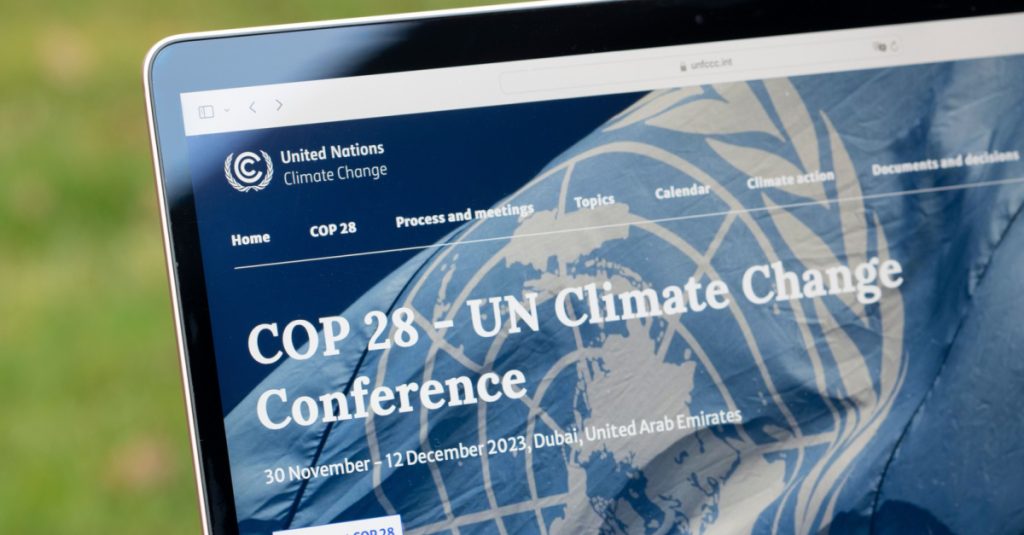As the curtains closed on COP28 last week, the urgency and significance of this global summit that included leaders from around the world have never been clearer.
This conference, held in Dubai and central to the United Nations Framework Convention on Climate Change (UNFCCC), brought together leaders, experts, and activists to forge a path toward a more sustainable future. With its ambitious goals, COP28 highlighted the critical need for accelerated climate action, underscoring the importance of global cooperation in this decisive decade for climate change.
At Greenabl, we recognize the importance of staying informed and actively participating in the global climate dialogue. In pursuit of that mission, we share five key takeaways from COP28 that are relevant to individuals and organizations in the supply chain and logistics industry. Continue reading to learn more about what this pivotal event means for you, and contact us to discuss how to measure and offset your shipping-related emissions.
1. U.S. Leadership & Commitment
At COP28, the United States emerged as a leader in climate action, underscoring its commitment to global environmental initiatives. A significant highlight was Vice President Kamala Harris’s announcement of a $3 billion pledge to the Green Climate Fund. This move amplifies the U.S.’s ongoing efforts in international climate finance, which, as of 2023, stand at an impressive $9.5 billion. This financial commitment underscores the nation’s dedication to supporting global climate mitigation and adaptation strategies.
The U.S. also played a pivotal role in addressing methane, one of the most potent greenhouse gasses. In a collaborative effort with China and the United Arab Emirates, the U.S. hosted the Joint Summit on Methane and Non-CO2 Greenhouse Gases. This summit marked a critical step forward in international collaboration on climate change. Further cementing its leadership, the U.S. Environmental Protection Agency (EPA) announced robust new standards under the Methane Emissions Reduction Program. These groundbreaking standards aim to significantly curb methane emissions from the oil and gas sector, targeting an 80% reduction by 2038. The projected net climate benefits of these standards are estimated at a staggering $98 billion, demonstrating a powerful combination of environmental and economic progress.
2. Global Efforts & Progress
The U.S. did not stand alone in its efforts to combat climate change. Stephan Singer, the Senior Global Energy Advisor at the Climate Action Network, emphasized the necessity of a 60% reduction in greenhouse gas emissions by 2035. His insights underscored the urgency of the climate crisis and the need for legally binding commitments. The global stocktake update brought into sharp focus the critical need for concrete and enforceable actions in international climate agreements.
Another significant stride was the launch of the Global Cooling Pledge, backed by the United Nations Environment Programme (UNEP). Alongside this, UNEP released its “Global Cooling Watch” report, titled “Keeping It Chill.” This initiative focuses on sustainable ways to meet growing cooling demands without exacerbating climate change. The report advocates for passive cooling measures, improving the energy efficiency of cooling equipment, and reducing the use of hydrofluorocarbon refrigerants, aligning with the goals set by the Kigali Amendment.
The formation of the Utilities for Net Zero Alliance (UNEZA) also marked a major commitment from the utilities and power sector. This alliance, consisting of 25 global utilities and power companies, aims to achieve net-zero sectoral emissions by 2050. UNEZA’s strategy involves electrification, clean energy deployment, mobilizing finance, securing supply chains, developing skilled workforces, and collaborative work with lawmakers and regulators. This alliance signifies a collaborative and industry-driven approach to addressing climate change.
3. Private Sector Involvement
The private sector’s role in climate action was notable at COP28, primarily through the PREPARE Initiative and advancements in clean transportation.
The President’s Emergency Plan on Adaptation and Resilience (PREPARE) witnessed the commitment of 21 prominent companies, marking a significant private sector contribution to climate action. These companies have collectively mobilized an estimated $2.3 billion in adaptation finance, specifically targeted at developing countries. This initiative represents a substantial financial commitment and underscores the economic rationale behind investing in adaptation and resilience. Studies, including one from a PREPARE signatory, suggest that every dollar invested in these areas can yield between $2 to $15 in financial benefits, highlighting the dual benefits of environmental responsibility and economic prudence.
In the realm of transportation, COP28 brought renewed focus on clean, sustainable travel. The Call to Action to double the share of energy-efficient and fossil-free land transportation by 2030 saw significant progress. This initiative, supported by more than 50 multi-sector organizations, including Chile and Colombia, aims to transform the transportation sector. Partnerships with entities like the Partnership for Sustainable Low Carbon Transport and REN21, alongside key transportation organizations, are driving this ambitious goal. Collaborations like these reflect a comprehensive approach to reducing emissions in one of the most critical sectors contributing to global greenhouse gases.
4. Nuclear Energy as a Climate Solution
A significant development at COP28 was the renewed focus on nuclear energy as a key player in the fight against climate change. Spearheaded by U.S. Special Presidential Envoy for Climate, John Kerry, and endorsed by over 20 countries, the Declaration to Triple Nuclear Energy emerged as a pivotal moment. This declaration represents a global consensus on the importance of nuclear energy in achieving carbon neutrality and limiting the rise in global temperature, in line with the objectives of the Paris Agreement.
The endorsement of nuclear energy at COP28 acknowledges its potential as a reliable and low-carbon energy source. This move signals a shift toward diversifying the energy mix and incorporating more sustainable and scalable solutions to meet the world’s growing energy demands while addressing the urgent need to reduce greenhouse gas emissions. The collective push to triple nuclear energy acknowledges the importance of leveraging advanced technologies and innovations in the nuclear sector to ensure safety, efficiency, and public acceptance.
5. Maritime Carriers Stepping Up for Climate Action
At COP28, CEOs from five leading maritime companies — CMA CGM, Maersk, MSC, Hapag, and Wallenius Wilhelmsen — united to advocate for the industry’s decarbonization. They called for an end to fossil fuel ships, aligning with the International Maritime Organization (IMO) for regulatory support and clear measures to boost green investments.
A central proposal from these industry leaders includes setting a termination date for new fossil fuel-only vessels and establishing a definitive Greenhouse Gas Intensity Standard. This approach aims to foster investment in new, sustainable ships and related infrastructure. They also advocate for a vessel pooling method in regulatory compliance, allowing collective performance assessment.
This unified declaration at COP28 marks a significant step toward the maritime industry’s proactive role in climate action, showcasing the critical impact of regulations and collaborative efforts in reducing environmental footprints.
Charting a Sustainable Future: How Greenabl Empowers Change in the Wake of COP28
COP28 has brought to light pivotal insights and commitments, reinforcing the global urgency to combat climate change. From the U.S.’s substantial financial pledges to innovative initiatives like the Global Cooling Pledge and the emphasis on nuclear energy, the conference showcased a diverse range of strategies to address the climate crisis.
Now, it’s time for the rest of us to do our part.
At Greenabl, we offer a platform that empowers shippers, carriers, and others in the logistics sector to measure and offset their emissions effectively. By leveraging Greenabl’s tools and resources, these stakeholders can contribute significantly to the solution to climate change while also staying ahead of potential regulations related to emissions in shipping.
Contact us to learn more about joining the fight against climate change by measuring and offsetting your shipping-related emissions.


